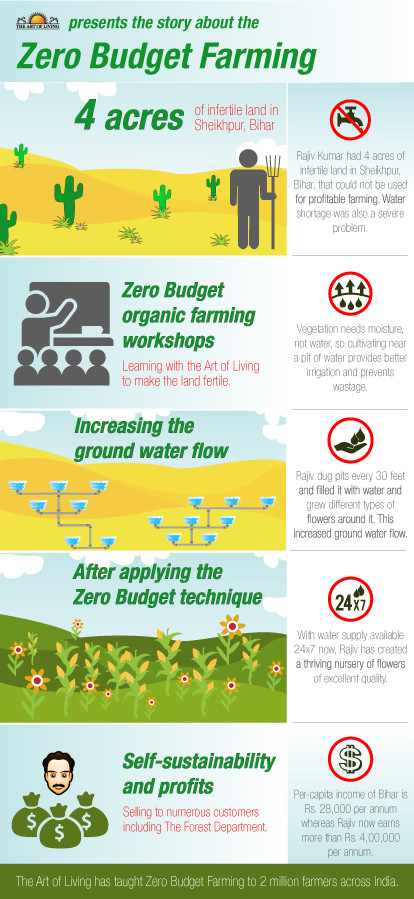There is widespread interest and knowledge on eating right today. Along with a balanced diet, the quality of the produce that we consume has gained much recognition. In this regard, some farmers in Madhya Pradesh, India have taken the ZBNF route to better nutrition.
What is ZBNF?
Zero Budget Natural Farming (ZBNF). Say what? It is, basically, a natural farming technique that uses biological pesticides instead of chemical-based fertilizers. Farmers use earthworms, cow dung, urine, plants, human excreta and such biological fertilizers for crop protection.
Till recently, they were reluctant to utilize natural or spiritual farming techniques. The fear was that it would reduce their produce. After all, chemical fertilizers have been used for decades to increase nutrients to the crops. So what changed their mind?

Spiritual farming and its benefits
The truth is that Zero Budget Natural Farming (ZBNF) reduces farmers’ investment, not their produce. In fact, it enables them to plow back their entire earnings into their crops. Ordinarily, expenditure on fertilizers takes away a significant chunk of their income.
Another huge advantage of Zero Budget Spiritual Farming is that it protects the soil from degradation. Repeated use of chemicals, makes land infertile and hence, unfit for farming over time.
We spoke to an educated farmer Swadesh Chowdhary. The BSc graduate and family-man from Betul in Madhya Pradesh admits, “I had actually spoiled my land with the use of chemicals! It was in 2010 that I was introduced to natural farming. Initially, I began with two acres on a bad soil patch. Today my entire 30 acres is under the healthy influence and protection of natural farming.”
How to start Zero Budget Natural Farming
Farmers can undergo a Zero Budget Natural Farming (ZBNF) course that teaches them about techniques of natural farming that incurs minimal to no expense.
Farmer Swadesh visited multiple model farms of natural farming in Maharashtra. He shares, “I was so impressed with the results there. I found natural farming easy and in expensive. Over the next few days, I visited more model farms in Maharashtra; the farmers there shared really heart-touching success stories of natural farming.”
To try ZBNF or not?
Swadesh had made a commitment to experiment on two acres, but come fertilizing stage he was, understandably, reluctant. However, he did make the vital switch by deciding to give ZBNF a go.
Results of Zero Budget Spiritual Farming
“In the first year, the output of wheat was around 12 quintals. In the second year, the output increased by another two quintals. I consulted with Dr. Keshav Vyas for guidance. I now practice 30 acres of natural farming in my farm; that is, my entire land,” he reveals.
ZBNF vs Traditional fertilizers
Generally, chemical companies visit farmers with various products. “Such companies make us experiment different chemicals. They, inevitably, leave us confused. Our farms suffered. It broke us apart,” Swadesh rues.
“When I had sowed soya bean, my produce was six quintals. However, my entire earnings were spent on chemicals again, unlike in natural farming. The name of the practice is absolutely justified–ZeroBudget Farming,” Swadesh beams.
Thyme, a chemical used in sugarcane plants led to the death of squirrels, birds,and insects. This was one of the most compelling arguments against chemical farming. After all, how can humans consume food that kills animals?
“In the ZBNF course, interactive sessions make it helpful. Promising results shared by other farmers strengthened our trust in natural farming.
Moreover, the expense for one acre in natural farming is just Rs.300, as opposed to Rs.2000 in chemical farming. It is because the manure and the fertilizers are all made at home. Also, due to the concept of inter cropping, I reap twice the investment.”
Natural farming is the future
Imagine your land with soft soil that you can dig easily with your hands. Top it up with earthworms that do your work for you! That is the promise of spiritual farming!
“In my experience, it is a big loss to practice chemical farming. Just take oil for that matter. There are two types of oils - refined and filter. Refined is consumed by the majority of Indians and it is made of chemicals! Farmers have to understand the damage chemicals inflict on the soil, crops, health, and environment,” shrugs Swadesh.
No doubt, the life of a farmer is risky and uncertain. So many aspects are beyond their control. Decisions can make or break their livelihood. Swadesh attributes his courage to switch and his hope for the future, to his daily practice of Sudarshan Kriya. “It helps you maintain your enthusiasm forever in spite of problems,” he says of the signature program of the Art of Living organization.
Join Swadesh in his healthy quest. Merge with nature! Naturally-grown food and natural farming jointly nurture humanity in a healthy way!
If you like to contribute your time to our agricultural projects, please write to us at webteam.india@artofliving.org.



















